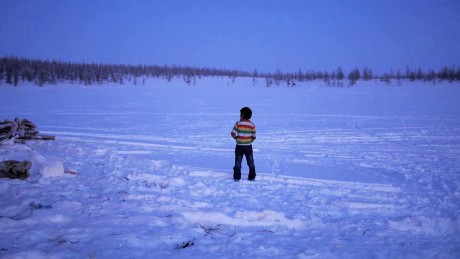


Three Russian Documentaries at IDFA

… which all deserve to be mentioned and noticed by other festivals.
“How Big is the Galaxy” (Photo) by Ksenia Elyan (Russia, Estonia, 72 mins.), with Max Tuula and Maria Gavrilova as producers as well as late Alexander Rastorguev for Black and White Cinema, is a gem, with two charming kids Zakhar, 7 years old and the older brother Prokopy. They live far up in North of Siberia with their parents, as – taken from the IDFA website – “belonging to the Dolgan community, one of the last indigenous peoples pursuing their traditional nomadic life in the extreme north of Siberia.” It’s an observational documentary, you follow everyday life with a special focus on the kids, who go to school next door, allowed to have homeschooling. Out of the warmth in the wagon-like house, where the family lives, out in the freezing cold to the next door house that serves as a school with a school teacher and books etc. Zakhar has an eye for the director/cameraman asking her “you take photos”, “is that a job”. Lovely.
“The Potato Eaters” by Dina Barinova (Russia, 51 mins.) from Marina Razbezhkina Studio, a tough social documentation of a village life in awful poor conditions, also featuring two children, who live and play as kids do, jumping in water puddles. They live with their grandparents Svetlana and Victor, the latter deeply alcoholised, Svetlana being the one, who has to take care of everything – without any money. It’s as bad as it could be. Depressing and shocking to watch if not for the kids and Sergei, who is the son of Svetlana and Victor, and the one who moves a bit around and plays vinyl records.
“Dorotchka” by Olga Delane (Russia, 20 mins), who made the fine “Siberian Love”, where she met the 80 year old woman and decided to dedicate a film to her. The IDFA website text is excellent so I quote: “The beautiful, static images of Dorotchka in and around her wooden house, against the backdrop of a relentless landscape in which there’s constant hard work to be done, are reminiscent of 19th-century paintings of romanticized agricultural life. Wringing her hands at the kitchen table, Dorotchka speaks in short sentences peppered with expletives, making it clear that even women like her have their hearts broken. Stylized shots of rural life are combined with comical black-and-white footage of Russian country weddings, folk dancing and singing: a promise of opportunities in a bygone era.” “Siberian Love” is reviewed here: http://www.filmkommentaren.dk/blog/blogpost/3930/